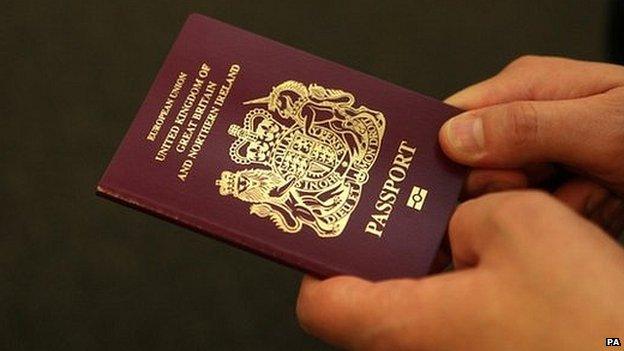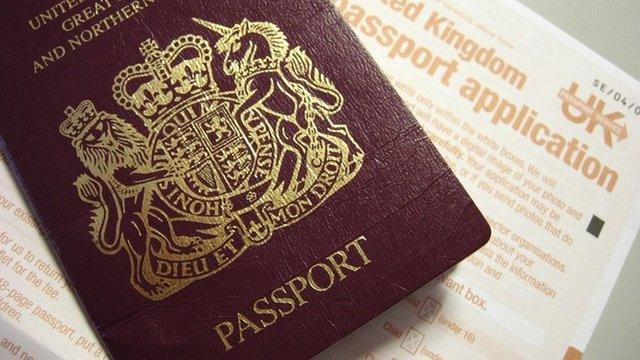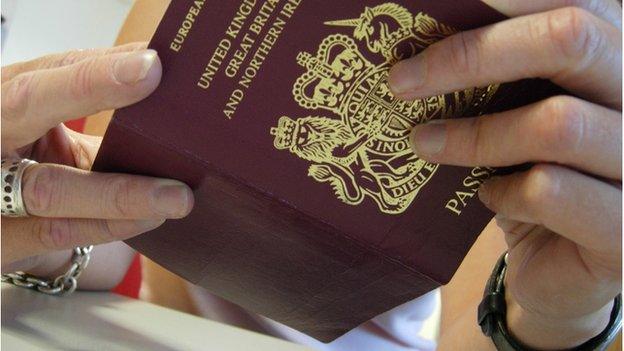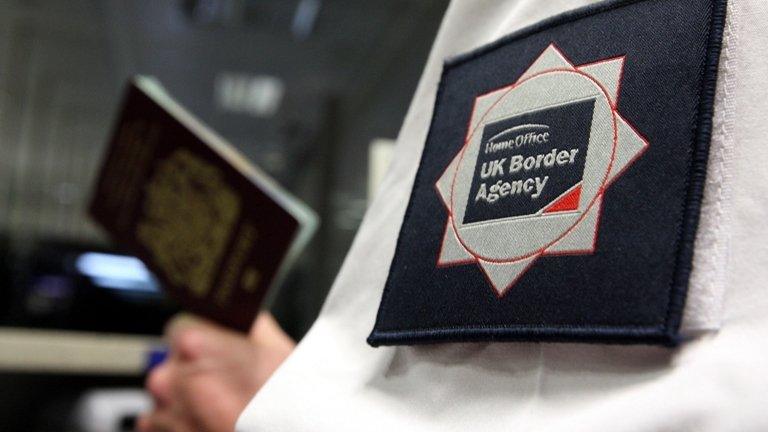Passport boss Paul Pugh denies 'chaos' claims
- Published
The head of the Passport Office Paul Pugh: "The organisation is not in chaos"
The number of passports being issued is increasing as staff attempt to clear a large backlog, the home affairs committee has been told.
Passport Office chief executive Paul Pugh said 170,000 passports had been issued in the past week, a slight increase on the previous seven days.
But he admitted the number of passport applications in the system had gone up.
He denied claims by a passport worker, to BBC Radio 4's PM, that the office was in "total crisis".
Mr Pugh apologised last month for the distress caused by the backlog, which he said had been caused by an unexpected surge in demand for passports.
Fast-track service
He was hauled back in front of the committee earlier on Tuesday, to be quizzed on what progress had been made in clearing the backlog, amid claims by MPs that it was getting worse.
He told the MPs: "Work in progress is falling and output is rising substantially.
An employee at the Passport Office says it is in "total crisis"
"We are now issuing over 170,000 passports each week. I expect that to continue and rise over the summer. For each week over the summer I expect us to be issuing in the region of 180,000 passports per week."
When pressed by committee chairman Keith Vaz, he conceded that applications classed as "work in progress" had gone up since his last appearance from 483,000 at the start of June to 508,000 last week, but he stressed that this figure was now falling.
Home Secretary Theresa May has ordered a series of emergency measures, including giving UK citizens living overseas an automatic one-year extension to their passports.
People with an "urgent need" to travel can also upgrade to the fast-track service for free for a limited period.
'Total mess'
But an employee at the Passport Office, speaking anonymously to PM on Monday, said the emergency measures were "making things 10 times worse" and presented a "huge security risk".
The whistleblower estimated about 100,000 passports did not appear in the official figures because they had not yet been scanned on to the system.

Officials say they are handling nearly 400,000 more applications than during the corresponding period in 2013
She claimed the agency was "in total crisis, a total mess".
People were being taken off their usual jobs and issuing passports with "a few days' training", presenting security risks because they might not be able to spot a fraudulent application and computers were crashing for up to half a day at a time.
Mr Pugh hit back at the criticisms, telling the committee: "I completely disagree with the comments that are attributed to this anonymous member of staff."
He added: "I think the vast majority of staff across the organisation would refute what that member of staff is saying. The organisation is not in chaos."
He admitted that the "freakishly high" levels of overtime being carried out by staff to deal with the backlog could not continue, but he said extra staff were being recruited.
He again admitted he did not know why there had been a sudden surge in demand for passport renewals, rejecting claims by Mr Vaz that it was down to the closure of seven overseas passports centres and the transfer of the work to the UK.
He also rejected claims by some MPs that it was down to an upturn in the economy, saying there was "no evidence" for this, although, he added, the agency no longer took economic factors into account when forecasting demand.
The Home Office's chief scientific adviser had launched an inquiry into why the Passport Office's forecasting system had failed to predict the surge in applications, Mr Pugh told the committee.
Mr Pugh also admitted the increase in demand would lead to a boost in income from fees for his office and it was expected to make a surplus of £50m this year - the same as it had in 2013 - that would be handed to the Treasury.
Mr Vaz handed Mr Pugh 180 emails from members of the public who were facing delays in their applications for his private office to deal with.
The Home Office has said it is not unusual during peak periods for the Passport Office to operate with high numbers of applications in the system at any one time and insisted it was getting to grips with the problems.
- Published7 July 2014

- Published20 June 2014

- Published17 June 2014

- Published13 June 2014
